
Business success depends on two key factors: understanding who your customers are and being willing to pivot when the market demands it. Get these two things right, and you'll be well on your way to building a business that lasts. Businesses today bank on market research tools to get the edge they need.
Raw data doesn't stay raw for long with these tools. They extract targeted insights that spark action. When you have the right tool, the fog lifts, and you can see where to adjust your marketing, find promising openings, and stay out of financial traps.
What's the missing link between blindly throwing market research resources at a problem and intelligently allocating them? Market research, of course! Businesses are looking for the best market research platforms, and we answered with this top 10 list for 2025. We'll examine the benefits, outline the methods that get the job done, and explain how this intel can revolutionize how you approach your business.
What is Market Research?
Imagine having a direct line to your ideal customer's thoughts and desires. You'd know exactly how to help them shine. That's the power of market research — it's like having a treasure map of their needs.
Get past the surface level and dig into the numbers. That's where the real, valuable insights await. Business success without customer insight is like driving with your eyes shut; it's a wreck waiting to happen. Business prosperity hinges on one thing: knowing your customers inside and out.
Customer intelligence gathering is key. What are their hot buttons? What are they buying? What keeps them coming back? Bring these consumer insights into play, and you'll witness a tangible transformation: your products will become more compelling, your marketing will hit its mark, and your business will hum along more smoothly than ever.
Benefits of Conducting Market Research
Conducting market research is one of the smartest moves any business can make. It provides a clear picture of your target market, helping you understand what drives customer decisions. One major benefit is that it reduces risks. Instead of guessing what your target audience wants, you rely on real data. This minimizes the chances of launching a product that flops or investing in a marketing campaign that doesn’t connect.
Another key benefit is gaining a competitive edge. Market research helps you keep tabs on your competitors. You can see what they’re doing well, where they’re falling short, and find opportunities to stand out.
Let's say your company is using intelligence tools for media agencies. It helps you uncover hidden details about your competitors' strategies, ads, and audiences to stay ahead of the competition. What's working in today's market is crucial knowledge if you want to sprint ahead of the competition and stay there. A pulse on the industry heartbeat helps you respond before the competition.
Types of Market Research Methods
There are several methods businesses use to conduct market research.
- Surveys: Free market research tools like SurveyMonkey enable easy survey creation and data collection. Surveys can be distributed online to gather opinions, preferences, and feedback from a wide audience.
- Focus Groups: Think of a focus group like a conversational mirror, reflecting back the honest opinions and perceptions of a targeted audience, helping you better understand what resonates.
- Interviews: One-on-one interviews allow for an in-depth exploration of consumer behavior and preferences.
- Observation: This method involves observing how consumers interact with products in real-life settings.
- Secondary Research: Using existing resources such as industry reports, economic indicators, and databases like the Pew Research Center.
- Data Analysis Tools: Platforms like AdMall help in data visualization and uncovering patterns in large datasets.
What's working, what's not, and how to improve — businesses use digital marketing research tools to stay on top of online trends, customer engagement, and campaign performance. What's the secret to understanding your customers? It's having access to data that paints a complete picture that includes overarching trends and individual consumer habits.
Why Market Research is Vital for Business Success
There's no shortcut to building a business that stands the test of time. If you rely on intuition alone, you’re flying blind, exposing yourself to nasty surprises and missed opportunities. Say goodbye to pricey trial-and-error. Market research is your ticket to understanding your customers’ needs, wants, and pain points, helping you steer your business in the right direction.
Understanding the Target Audience and Customer Needs
Knowing your audience is key to business success: you must grasp who you're selling to before you can sell them anything. Identifying your target audience is just the beginning: market research also reveals what makes them tick and how they approach making a purchase.
What if you could create products and messages that really connect with your target market? Customers have problems; that's a given. But with market research tools working behind the scenes, you'll identify those pain points and see how your product or service can fix them.
Identifying Market Trends and Opportunities
Market trend spotting and growth opportunities await businesses that commit to market research. It's a strategic move that pays off. Staying one step ahead of the competition means keeping a close eye on search trends and consumer behavior and being ready to shift gears when the data points to a new direction.
For example, companies use advertising intelligence tools to track how competitors promote their products, which channels drive the most engagement, and what types of content resonate with audiences. This insight helps businesses refine their own marketing strategies to stay competitive.
Market research also highlights gaps in the market — areas where customer needs aren’t being met or where demand is growing. Stay ahead of the curve by spotting these openings, and you'll be first to market with innovative products or venturing into uncharted territories, leaving the competition in your wake. Don't just follow the crowd; set the pace by anticipating what's next.
Informing Product Development and Launch
Bringing a new product to market is a significant investment. Success often hinges on understanding what customers truly want. Product development takes a giant leap forward when you tap into your target audience's thoughts, desires, and pain points. This insight helps your business turn those ideas into reality.
Marketing strategies that drive results start with good old-fashioned market research, the crucial first step in making product launches a smashing success. When it comes to reaching your audience, you need to find the sweet spot — the channel, the message, and the moment that sparks connection and drives action.
The 10 Best Market Research Platforms in 2025
Choosing the proper market research platform can make all the difference in how effectively you gather, analyze, and apply valuable data. A tool that mirrors your business vision, respects your budget, and pushes the boundaries of research excellence is the one you want on your side.
What will separate the winners from the rest of the pack in 2025? These ten exceptional market research tools are engineered to supercharge your results with innovative features, hyper-useable interfaces, and a truckload of tangible, concrete data that means business.
1. AdMall
AdMall is designed to help sales professionals and marketers uncover new opportunities. It provides detailed local market data, making understanding customer behavior and spotting sales prospects easier.

What sets AdMall apart is its focus on real time insights tailored to specific industries and regions. You’ll find helpful reports on local demographics, spending habits, and competitor activity all in one place. Try it risk-free for two weeks and discover if it's the perfect fit.
2. Meltwater Radarly
Meltwater Radarly helps businesses keep track of what’s being said about their brand online. Stay plugged into the social media buzz surrounding your brand, and get real-time feedback that turns conversations into advantages.
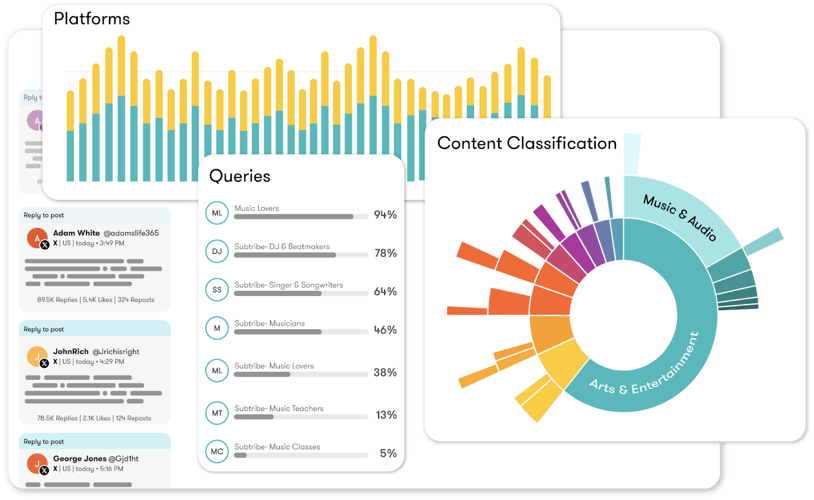
With every shred of relevant data at your fingertips, the guesswork disappears, leaving you with a crystal-clear path forward. Radarly keeps you connected to your audience and ahead of the curve with an easy-to-use dashboard and robust analytics.
3. SurveyMonkey
With SurveyMonkey's free market research tool, crafting surveys and collecting valuable feedback is a breeze. Whether you want to know what customers think, check employee satisfaction, or run a quick poll, it makes the process easy. With the platform's templates, you're off and running in no time.
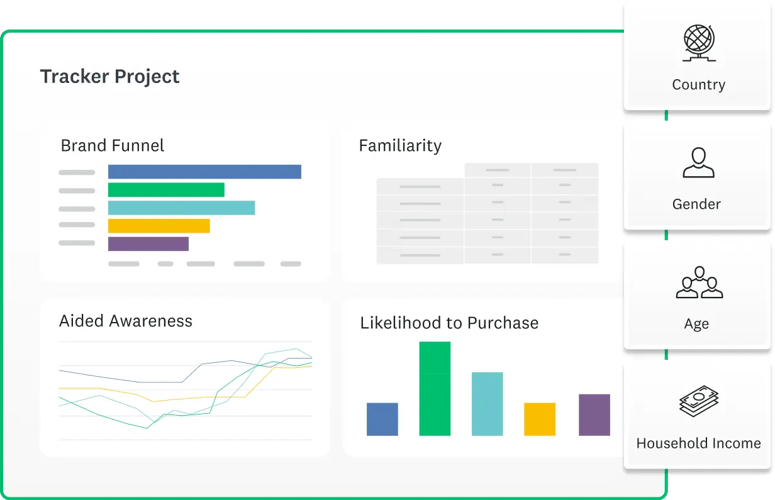
Using built-in tools that flag important patterns and discoveries, you can sift through your results. Beyond its own features, SurveyMonkey also plays nicely with CRM systems, keeping all your data tidy and connected. It’s simple, effective, and flexible for businesses of all sizes.
4. Heartbeat AI
Heartbeat AI helps businesses understand what customers are really thinking. It analyzes feedback, reviews, and social media posts to uncover emotions and patterns that typical data tools might miss. This market research tool focuses on boosting customer satisfaction and building loyalty. With Heartbeat AI’s real-time tracking, you’ll know right away when customer sentiment changes, allowing you to pivot quickly and keep your audience engaged and happy.

5. Discuss
Discuss market research insights is all about helping businesses get detailed insights from their customers. Instead of just sending out surveys, you can run live focus groups and interviews online. This lets you hear directly from people about what they like, what they don’t, and what could be better.

With Discuss providing valuable insights from conversations, it becomes a walk in the park — just record, transcribe, and examine the chats to pinpoint what people are really saying. Take a new product concept for a spin, zero in on what resonates with your target market, and craft marketing messages that truly hit home with Discuss.
6. Tableau
Tableau turns complex data into clear, easy-to-read visuals like charts and dashboards. Tech novice or pro, it's an equal-opportunity experience — no expertise is needed to get started. By consolidating a maze of spreadsheets and databases, Tableau fashions a lucid storyline that pinpoints connections, glitches, and sudden epiphanies that might have remained hidden.
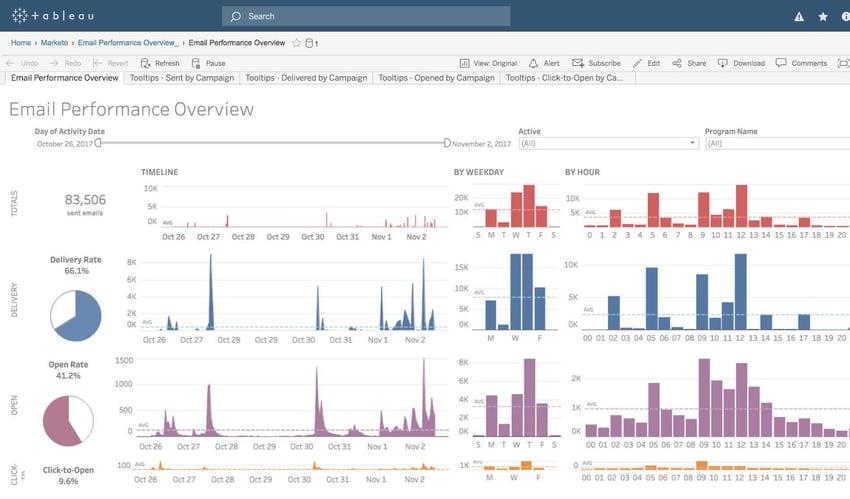
7. ZoomInfo Sales
Your business can boom when plugged into ZoomInfo Sales, linking with leads primed for conversion. It’s like having a supercharged contact list. We're talking high-octane info on companies, the movers and shakers, and the industry trends that matter most.
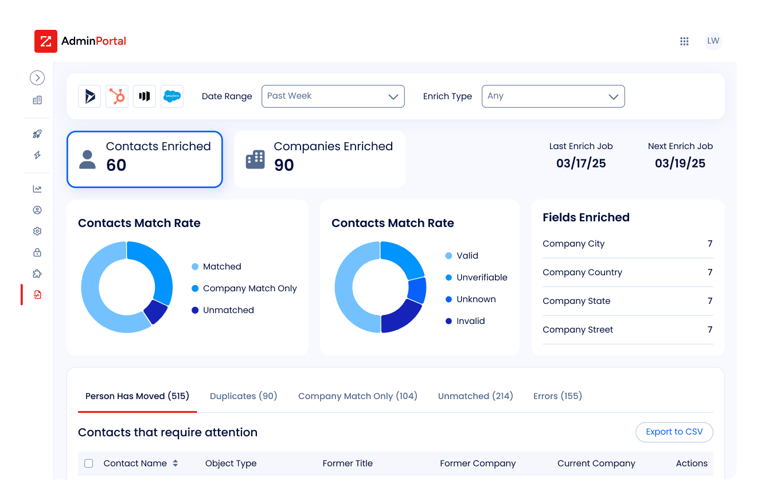
Easily pinpoint promising leads by narrowing down your search using criteria like job titles, company sizes, and industries that align with your business goals. Stay ahead of the curve with ZoomInfo, which feeds you fresh company data as it happens, allowing you to connect at the most opportune times.
8. AlphaSense
If your business is overwhelmed by information, AlphaSense skillfully sorts, digests, and presents the insights you need to stay ahead. What if you could see beyond the headlines and data points? This AI does just that, exploring financial reports, news articles, and research papers to identify winning opportunities and potential pitfalls. With a constantly shifting market, don't let crucial business insights elude you. Turn to AlphaSense for the critical inside track.

9. Data.ai by Sensor Tower
Data.ai, previously known as App Annie, is a top analytics tool for tracking mobile app performance. It gives businesses insights into app downloads, user engagement, revenue, and competitors' actions. If your business operates in the mobile app space, Data.ai helps you see what’s working, where you can improve, and how you stack up against others. Get clarity with the intuitive dashboard, where trending data comes alive, and multi-platform comparisons help you separate signal from noise.

10. Stackline
Stackline helps businesses grow their online sales by providing detailed e‑commerce insights. It offers a triple-lens view of major online marketplaces: tracking product performance, analyzing customer actions, and monitoring competitor activities in real time.
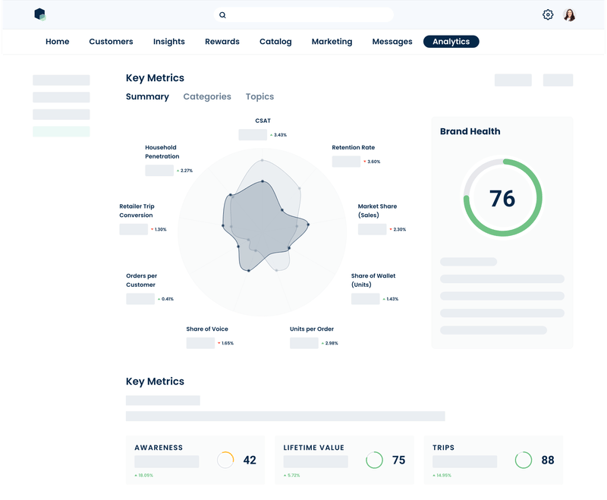
To crack the code on sales success, look no further than advanced analytics. It's like having a backstage pass at what's really working (and what's not) in your marketing mix. With Stackline, its predictive insights keep you one step ahead, mapping out the best course of action.
How to Choose the Right Market Research Tool
With so many market research tools, finding the right one can feel overwhelming. The best tool for your business will depend on your specific needs, goals, and budget. Some tools are designed for deep data analysis, while others focus on customer feedback or competitor insights.
Evaluating features, pricing, and how well the tool aligns with your business objectives is vital to making the right choice. Before making a commitment, give yourself time to survey the landscape, accumulate insights from fellow users, and indulge in a test drive or two. Only then will you zero in on the perfect solution for your organization.
Evaluating Tool Features and Pricing
When choosing a market research tool, start by evaluating its features. Look for key capabilities like data visualization, real-time analytics, survey creation, and integration with your existing software. The right tool should be user-friendly, offer customizable reports, and support the type of data you need: customer feedback, competitor analysis, or industry trends.
Pricing is another critical factor. Some tools charge based on features, user access, or data volume. Consider your budget and weigh the cost against the value it provides.
Considering Business Goals and Objectives
Your business goals should guide your choice of a market research tool. Start by identifying what you want to achieve — are you looking to understand your target audience better, track emerging trends, or improve product development? Let's say your focus is on advertising performance. You'd want a tool with strong advertising intelligence features.
When marketing to healthcare pros, getting precise market data is crucial. That's where market intelligence tools for healthcare marketers come in. Consider how the tool aligns with your broader marketing strategies and decision-making processes.
Reading Reviews and Case Studies
Before committing to a market research tool, read its reviews and case studies. Honest reviews from people who've actually used a tool can give you the lowdown on its best features and glaring flaws. Assess each tool's track record on converting data into actionable advice while also considering the level of support you'll receive along the way and how intuitive the interface is.
Witness firsthand how companies like yours have used the tool you're interested in to drive meaningful change; that's exactly what case studies offer. Real-life success stories and tangible results give their claims teeth. Instead of reinventing the wheel, draw on the experiences of others to identify a tool that's providing data-driven insights within your industry time and time again.
Free Trials
Free trials are an excellent way to test out a market research tool before making a financial commitment. Take a platform for a spin during the trial period to see how its tools and layout gel with your workflow and business needs.
During a trial, focus on how easy the tool is to navigate, the quality of data it provides, and whether it meets your market research goals. Take advantage of tutorials or customer support to get the most out of the trial period. Testing a tool firsthand is one of the best ways to ensure it’s the right fit for your business needs.
Best Practices for Using Market Research Tools in 2025
To get the most out of your market research tools, follow these smart strategies. Here are six key strategies for using these tools effectively in 2025:
- Define Clear Objectives. Before you begin data collection, know what you’re trying to achieve. Are you looking to understand customer preferences, track competitors, or explore new markets? Having clear goals helps you focus on the right metrics and avoid information overload.
- Combine Multiple Data Sources. Relying on just one source of data can limit your insights. Pinpointing your target audience's needs and preferences is a cinch when you couple customer surveys with social media feedback and sales insights. This method adds clarity to your research, revealing hidden patterns and participant habits that may have otherwise gone unnoticed.
- Keep Data Up-to-Date: Market insights and conditions change quickly, especially in fast-paced industries. Regularly update your research to reflect current trends, customer needs, and competitive landscapes. Outdated data can lead to poor decision-making.
- Focus on Data Quality: Accurate data is critical. Ensure that the data you’re collecting is reliable and comes from credible sources. Pay attention to how the data is gathered, cleaned, and analyzed to avoid skewed results.
- Use Data to Drive Decisions: Acting on data turns information into insight, but without it, you're just collecting noise. Translate your research findings into actionable marketing, product development, and business growth roadmaps. It's the fastest route to success. What if you could identify trends before they emerge? You can snatch opportunities from under your competitors' noses by analyzing patterns in your data.
- Protect Data Privacy: Make sure you’re following best practices for protecting customer information. Safeguard your customers' trust by choosing reputable platforms, staying regulation-compliant, and being open about your data collection and usage practices.
Don't just guess; get the facts. By following these best practices, you'll be drawing from a rich well of market research data, fine-tuned to help your business outmaneuver the competition.
Start using Market Research Tools Today!
Think your business has what it takes to boom? Put market research to work and watch it happen. The marketplace is a level playing field until someone whips out their research tools, suddenly transforming ambiguity into clarity and confusion into confidence. Turning customer opinions into business opportunities and using market research tools can change how you tackle growth and strategy.
Among the options available, AdMall is a versatile, user-friendly platform designed to deliver actionable insights quickly. Think of this asset as a marketer's insider, armed with expertise on local customer needs, rival companies' plays, and weekly sales opportunities to help you craft an unbeatable marketing playbook. Take a test drive; no strings are attached! You get two weeks to play around with the features and see if they gel with your business goals.
Don’t let guesswork guide your decisions. Start leveraging data today to identify new opportunities, connect with your audience, and outpace the competition. Sign up for AdMall’s free trial now and see how easy it is to turn raw data into real growth. Your next big business breakthrough could be just one insight away.
What are the main benefits of conducting market research?
Market research allows organizations to replace guesswork with evidence. When it’s done well, it lowers risk and sharpens decision-making across the board. Market research reveals who the customers are, what they care about and how they make decisions.
How do market research tools help businesses understand their customers?
Market research tools help businesses understand customers by turning behaviors, opinions, and patterns into usable insight—so decisions are based on evidence, not assumptions.
What factors should businesses consider when choosing a market research tool?
The right market research tool should be a good fit for a company’s goals, resources and target audiences. The tool should be able to reach the right audience and provide data in the right format — quantitative or qualitative. The cost and difficulty of deploying the tool should be key considerations. Businesses should also consider integration with existing tools and whether it will scale.
Can market research tools help businesses gain a competitive edge?
Market research tools are one of the most reliable ways businesses gain (and defend) a competitive edge. They don’t just provide data; they reveal where to compete, how to win, and when to move.
How can market research tools improve customer engagement?
Market research tools improve customer engagement by helping businesses understand, personalize and respond to customers in ways that feel relevant—not generic. The tools reveal what customers care about most, preferred channels and formats and motivations and pain points. Businesses can use the details to change what they offer and how they offer it.



